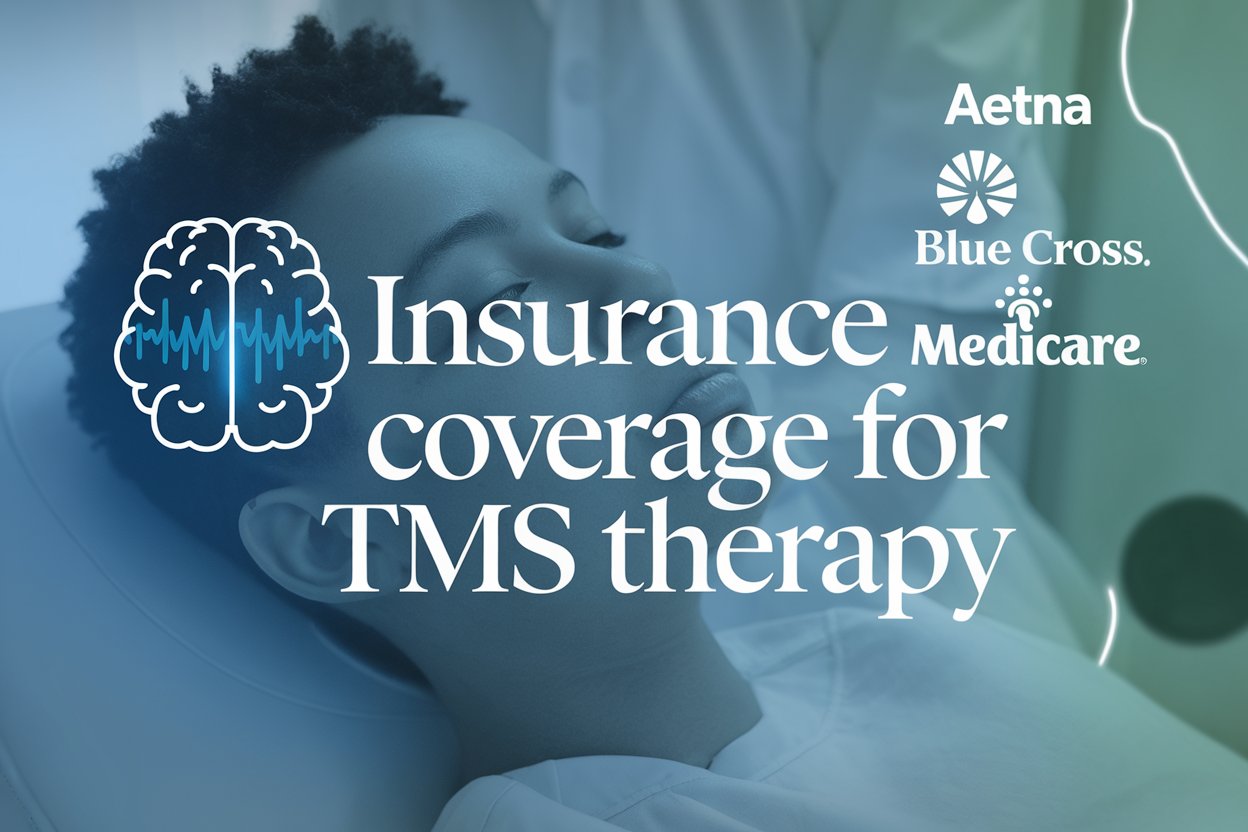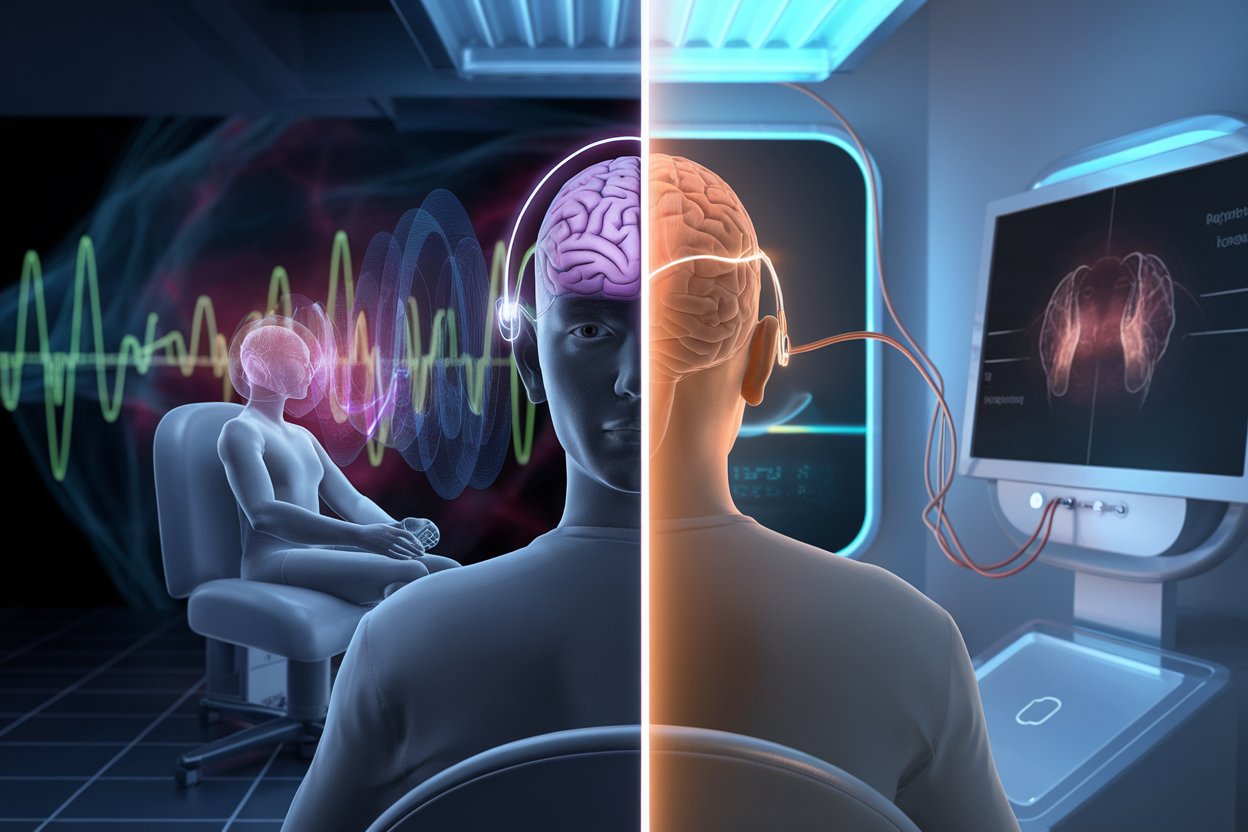Approach to TMS Treatment for PTSD
Hope for PTSD Treatment in Phoenix, AZ
Are you looking for PTSD treatment in Phoenix? At American TMS Clinics, we offer TMS therapy, a new and hopeful treatment for people thinking about helping with PTSD. TMS is approved by the FDA and is paid for by TRICARE and other insurance for treating major depressive disorder (MDD). However, using it just for PTSD is not officially approved and is not covered by insurance.
Understanding TMS Therapy for PTSD
TMS therapy is a safe treatment that uses magnetic fields to help areas of the brain that control mood and respond to trauma. It is mainly approved by the FDA for treating major depressive disorder, but it’s also getting noticed for its possible help with PTSD, especially when used along with MDD.
Scientific Research on TMS for PTSD Treatment
Research on using TMS for PTSD is a new area that shows hope for success. Although the FDA hasn’t yet approved TMS, a significant study in the “Journal of Psychiatric Research” suggests that it might help with PTSD.
Overview of Treatment for PTSD Studies
Study Design and Participants
The study included people with PTSD who did not get better with standard treatments. It was set up as a controlled clinical trial to test how effective TMS is.
TMS Treatment Protocol
The study used a set method for TMS treatment, focusing on parts of the brain linked to PTSD, like the prefrontal cortex. The frequency, strength, and length of the TMS sessions were carefully adjusted.
Outcome Measures
Lastly, the primary measure of the study was the reduction in PTSD symptoms, as assessed by standardized PTSD scales, including evaluations of symptom severity and impact on daily functioning.
Key Findings
Symptom Improvement
Firstly, participants who received TMS treatment showed significant reductions in PTSD symptoms, including improvements in hyperarousal, avoidance behaviors, and mood disturbances.
Response Rate
Secondly, the study reported a high response rate, with many participants showing clinically meaningful improvements in symptoms.
Potential Therapeutic Option
These findings suggest that TMS could be a viable option for individuals with PTSD, especially those who have not benefited from traditional therapies.
Neural Mechanisms
The research also explains how PTSD affects the brain and how TMS might help reduce its symptoms by changing brain activity. It’s important to understand how these mechanisms work to improve TMS protocols and better target them for better results for patients.
Symptoms of PTSD
Common symptoms of PTSD include:
- Intrusive thoughts or memories: Recurring, unwanted memories of the traumatic event.
- Nightmares: Disturbing dreams related to the trauma.
- Flashbacks: Feeling as if the traumatic event is happening again.
- Severe anxiety or hypervigilance: Constantly feeling on edge or in danger.
- Avoidance of reminders of the trauma: Steering clear of places, people, or activities that trigger memories of the event.
- Emotional numbness or detachment: Difficulty experiencing positive emotions or feeling disconnected from others.
- Difficulty sleeping or concentrating: Persistent trouble falling or staying asleep and challenges focusing on tasks.
TRICARE and TMS Therapy for PTSD in Phoenix
American TMS Clinics provides TMS therapy for major depressive disorder and accepts insurance, as they are an approved TRICARE provider. TMS for PTSD isn’t covered by insurance on its own, but if it’s combined with treatment for MDD, you might be able to get insurance support.This method can be very helpful for patients who have symptoms of both PTSD and depression.
PrTMS® at American TMS Clinics
Our clinic provides both standard TMS and PrTMS® (personalized repetitive transcranial magnetic stimulation). PrTMS® improves the regular TMS method by customizing the treatment to fit a person’s specific brain patterns. This method looks at brainwave patterns to tailor treatments, which could make therapy more effective, especially for difficult issues like PTSD. PrTMS® fits with our goal of providing personalized care for patients.
PTSD Treatment Method and Accessibility
Our TMS therapy sessions at the Phoenix clinic are made to be comfortable for patients. They usually take about 30 minutes and don’t require any recovery time, so patients can go back to their normal activities right away. TMS and PrTMS® are safe and gentle treatments that offer options for people looking for alternatives to standard PTSD therapies.
Our Commitment to Patient Care
At American TMS Clinics, we are dedicated to providing the latest treatments for PTSD in a caring and supportive setting. We know that PTSD can be complicated, and we’re here to help our patients with their treatment. The results of TMS therapy are promising, but more research is needed to confirm its effectiveness for treating PTSD over the long term and to improve treatment methods. As the field develops, TMS might become an important part of a combination treatment plan for PTSD.
Medication Management for PTSD
Our skilled doctors work with you to choose the right medicine to control your symptoms effectively. Managing medication is important for treating conditions like depression, anxiety, and other mental health issues. We keep track of your progress, change dosages as needed, and handle any side effects to make sure you get the best treatment.
If you or someone you know has PTSD and wants to try different treatments, consider TMS therapy at American TMS Clinics in Phoenix, AZ.
Contact Us for Information on Treatment for PTSD in Phoenix
Begin Your Recovery Today!
Start taking back control of your life with our help. Check if you are eligible for a free EEG and mental health assessment. Find out how TMS therapy can aid your PTSD treatment in Phoenix, Arizona.
CONTACT AMERICAN TMS CLINICS TODAY
Contact us today at (602) 922-0284 to start your path to wellness.
PTSD Treatment FAQs
What is currently the most effective treatment for PTSD?
The best treatment for PTSD usually involves both therapy and medication. For the treatment of PTSD, experts frequently suggest therapies with strong research backing, such as Cognitive Behavioral Therapy (CBT) and Eye Movement Desensitization and Reprocessing (EMDR). Medications, such as antidepressants, can help control symptoms. If these treatments don’t work well, many people look for alternative options like TMS (Transcranial Magnetic Stimulation) therapy.
What therapist is best for PTSD?
If these treatments do not work, many people look for other options like TMS (Transcranial Magnetic Stimulation) therapy. TMS can be helpful for PTSD, especially when used together with treatment for MDD (Major Depressive Disorder).If these treatments don’t work, many people consider new options like TMS (Transcranial Magnetic Stimulation) therapy.
What happens if PTSD is left untreated?
Not treating PTSD can lead to serious and long-lasting mental health problems. This includes depression, anxiety, drug use, and a higher chance of suicide. Untreated PTSD can greatly affect daily life, relationships, and overall well-being.
Can you ever fully heal from PTSD?
Some people fully recover from PTSD, while others may still have symptoms. Good treatment can greatly lessen symptoms and enhance quality of life, allowing people to handle their condition and enjoy their lives.
Does TMS therapy work for PTSD?
TMS therapy has been effective in helping people with PTSD, especially those who didn’t improve with regular treatments. A major study in the “Journal of Psychiatric Research” shows that TMS can help lessen PTSD symptoms. PrTMS® (personalized repetitive transcranial magnetic stimulation) improves regular TMS by customizing treatment to fit each person’s specific brain patterns, which may make it more effective.
What is the difference between TMS and EMDR for PTSD?
TMS (Transcranial Magnetic Stimulation) uses magnetic fields to stimulate parts of the brain that help control mood and respond to trauma. It is a non-invasive treatment mainly for depression, but it also looks promising for PTSD. EMDR (Eye Movement Desensitization and Reprocessing) is a type of therapy that helps people deal with and make sense of traumatic memories using guided eye movements. Both treatments help lessen PTSD symptoms but work in different ways.
Is TMS FDA approved for PTSD?
TMS is not approved by the FDA for treating PTSD. It is approved by the FDA for major depressive disorder (MDD), and insurance pays for it for this condition. Using TMS for PTSD is not officially approved and is not covered by insurance.
Citations with the URLs for the information mentioned:
- Journal of Psychiatric Research – Study on TMS for PTSD:
- Citation: Philip, N.S., Ridout, S.J., Albright, S.E., Sanchez, G., Carpenter, L.L. (2013). 12th cranial nerve stimulation: A possible treatment for PTSD. Journal of Psychiatric Research, 47(6), 843-850.
- URL: https://www.sciencedirect.com/science/article/abs/pii/S0022395613000747
- FDA Approval of TMS for MDD:
- Citation: Food and Drug Administration. (2008). FDA clears first transcranial magnetic stimulation device to treat depression.
- URL: https://www.fda.gov/news-events/press-announcements/fda-clears-first-transcranial-magnetic-stimulation-device-treat-depression
- TRICARE Coverage for Mental Health Services:
- Citation: TRICARE. (n.d.). Mental Health Care Services.
- URL: https://tricare.mil/CoveredServices/Mental
- Scientific Study on TMS for PTSD:
- Citation: Kozel, F.A., George, M.S., Simpson, K.N., & Nahas, Z. (2004). Using Transcranial Magnetic Stimulation to Treat Posttraumatic Stress Disorder. Journal of Neuropsychiatry and Clinical Neurosciences, 16(4), 535-536.
- URL: https://neuro.psychiatryonline.org/doi/10.1176/jnp.16.4.535
- American Psychiatric Association Guidelines for PTSD Treatment:
- Citation: American Psychiatric Association. (2017). Practice Guideline for the Treatment of Patients with Acute Stress Disorder and Posttraumatic Stress Disorder.
- URL: https://www.psychiatry.org/psychiatrists/practice/clinical-practice-guidelines





